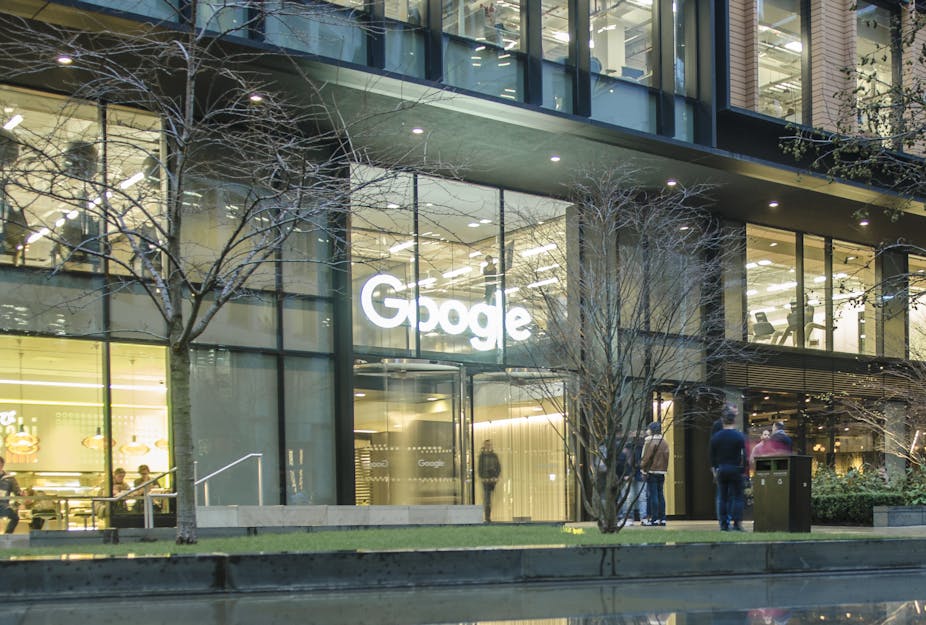The European Commission has fined Google €4.34 billion for breaching EU antitrust rules – the highest ever fine imposed in the EU. The case concerned a part of EU competition law that prohibits a business from strengthening its dominance in the market through certain business practices.
US President Donald Trump was quick to object to the fine, following on from an earlier interview with CBS, where he called the EU “a foe”. But both EU and US antitrust laws are put in place to foster competition in the market – so why is the fine such a flash point?
The first thing to note is that EU law does not prohibit a business from being dominant. The goal of any business is to maximise its profits, and most of the time, a business is successful because consumers buy its products or services. But it is illegal, under EU law, for a company to abuse its dominant position in the market.
This means that a business arrangement may be lawful when a company is not in a dominant position, but unlawful when a company is in a dominant position. Android OS – owned by Google – accounts for 80% of the market share of mobile operating systems in Europe. Since Apple iOS is not available for licensing, other mobile phone manufacturers have little choice but rely on Android – a fact which Google used to promote its own apps.
Google’s business strategy was to strengthen the dominance of its search engine and browser (Google Search and Google Chrome), by putting certain restrictions on the use of Android OS. The commission ruled that Google broke the law by forcing smartphone manufacturers to pre-install Google Search and Google Chrome, as a condition of licensing the Google Play Store on their devices.
This is called “tying”: where a business uses its dominance in one product or service (Android) to gain or consolidate the dominance of its other products (Google Search and Chrome). If Google was not dominant in the software for mobile operating system, tying would be lawful.

The company also paid some manufacturers and network operators for pre-installing Google Search on their devices, but not other search engines, and made it impossible for manufacturers to sell devices running on alternative versions of Android, which were not approved by Google.
Not just a value judgement
Defining which practices are abusive is no easy task, because most of the time it doesn’t depend on the nature of a business deal. Behind the enforcement of the antitrust laws, there is an idea of how the market economy should operate as well as complex factual assessments of the effects of the business practice under investigation. This does not mean that ethical preferences trump any economic considerations. Rather, market regulation reflects intertwined views on values, economic knowledge, social and political factors.
The US takes a minimalist approach when it comes to enforcing the law against “monopolisation” (broadly speaking, this corresponds to the EU’s prohibition of abuse of dominant position). In the US, courts, agencies and scholars have often interpreted the law in a way which results in limited enforcement.
The argument for the US approach goes like this: markets have a tendency to self-correct, whereas public intervention – such as antitrust enforcement – is counterproductive. Most of the time, a business is dominant because it is efficient. So, constraining its economic power creates inefficiencies, and sends the wrong message to businesses that want to enter the market or create new products.
The EU takes a different approach for historical, political and economic reasons. It places a “special responsibility” on dominant companies not to distort competition. And it holds that a dominant company has the right to compete as long as it does so on merit, by offering products and services that consumers value, rather than putting in place business practices designed to exclude competitors.
Same aim, different means
From the European Commission’s perspective, pre-installing Google Search and Chrome created a de facto status quo, which made it difficult for rival search engines to offer their apps – and ultimately served as a disincentive to innovate. So, rather than being a political decision against US businesses – as Trump seems to think – the EU’s fine against Google is also an attempt to protect competition.
At the heart of the issue are two different approaches to protecting competition. Put simply, the US approach is to only enforce antitrust laws when consumers pay more as a result of collusive or abusive practices. But the EU has a more sophisticated answer: to prevent consumers from paying more, but also to create an economic environment where businesses have a chance to compete.
Rather than having a monopolised market and then waiting for new entrants to challenge the dominant player, the EU prefers to enforce its laws to create a balance between the dominant business and existing competitors, while also encouraging new entrants to compete on the market. Consumers, the thinking goes, then benefit from both lower prices and wider choices.

